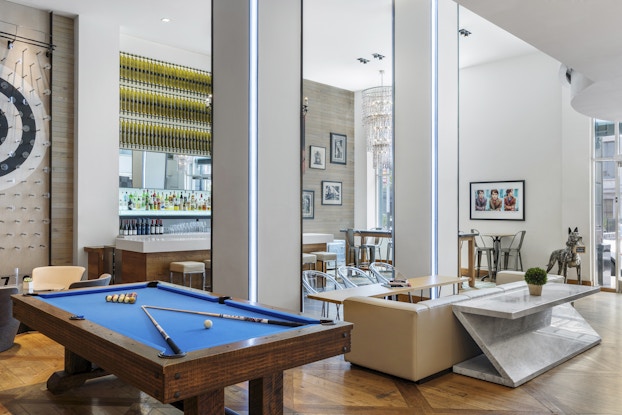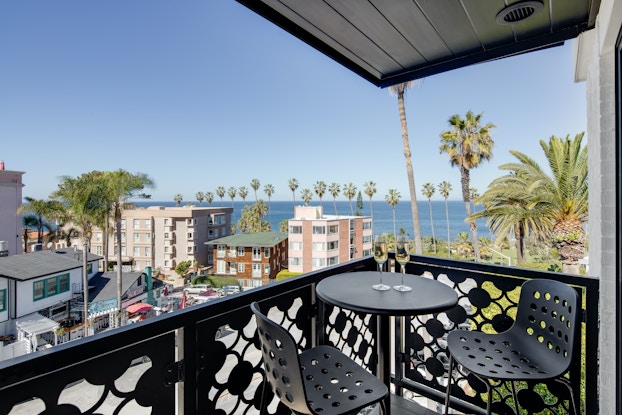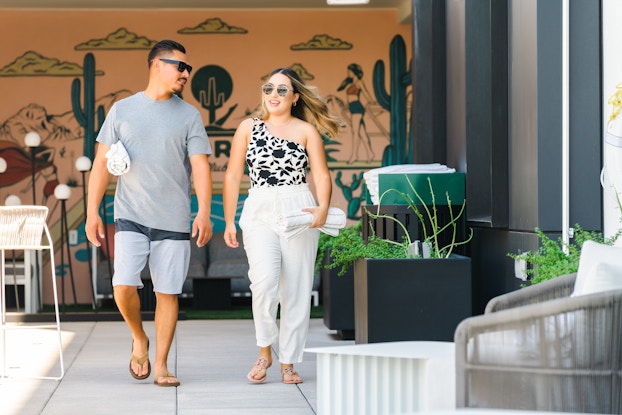
3 ways hospitality brands can appeal to millennials:
- Make it clear to millennials that they are number one by creating hospitality brands specifically for them.
- Offer unique, authentic experiences that quench the millennial thirst for personalization and curation, from offering foodie-geared local cuisine to live DJ events.
- Turn up the technology to both keep them engaged and deliver convenience, such as equipping rooms with digital voice assistants and promoting Instagrammable vacation moments.
Millennials love trekking miles. The generation born from 1981 to 1996 are road warriors who make travel a priority.
A 2021 survey by The Points Guy found that millennials are the demographic most likely to take longer vacations, fly in first class, pay more to stay at a nicer hotel or resort, and pay for their trip with points and miles. A survey from Hospitality Trends found that 68% of millennials planned to splurge or would consider splurging on a big trip, compared to 51% of boomers.
So it’s no wonder the hotel industry is rolling out the red carpet to get millennials to check in. They are courting them with tech bells and whistles (like Hyatt’s rollout in several U.S. hotels last year of room keys in Apple Wallet) that deliver an easy and contactless experience for check-in and checkout, as well as security and privacy benefits.
Hotels are also creating common areas that look intriguing and appealing and are “hotspots” for that perfect Instagram photo, and wowing them with activity-geared fitness perks like the W South Beach in Miami’s stylish rooftop basketball and tennis courts.
Then there are loyalty programs with VIP upgrades or discounts to keep them coming back, and family-friendly perks to attract the approximately 62% of millennial parents who are traveling with kids under the age of 5, according to a Resonance Consultancy report. Hotels get that millennials are looking for hotels and resorts that offer an experience, not just a place to stay.
Here's a look at four hospitality brands wooing millennials.
Hyatt Centric and Marriott’s Moxy: Making it clear millennials are number one by creating specific brands for them
There’s no confusion with Hyatt Centric: Millennials already know the answer to the question, “Who loves ya, baby?” Spend a minute on its website and you see it spelled out. “Hyatt Centric was created for millennial-minded travelers who want to be in the middle of the action.”
It starts with the lobby lounge, a launchpad where you can get intel on the most sought-after food, nightlife, and activities in town. The bar and restaurant are local hot spots where conversation, locally inspired food and signature cocktails can be enjoyed. Modern rooms focus on delivering everything guests want and nothing they don’t, including BeeKind environmentally conscious bath products, Bluetooth-enabled electronics, and salon-grade blow-dryers. And should you need them, there’s a team of concierges at the hotel always available to recommend local hidden gems, appealing to millennials’ appreciation for under-the-radar venues.
For example, Hyatt Centric Gran Via Madrid houses an Instagram-worthy mock recording studio in its lobby that pays homage to a local landmark recording studio across the street. And Hyatt Centric Times Square’s T45 Kitchen + Bar boasts the tallest rooftop in Times Square and global grub in a chic setting.
The focus on millennials is paying off. “The brand is growing strategically around the world, fueled by demand,” Crystal Vinisse Thomas, Vice President and Global Brand Leader for Hyatt Centric, told CO—. This year, Hyatt Centric added hotels in Silicon Valley, San Salvador, Montreal, Malaysia, and Ningbo, China.
Another brand throwing down the gauntlet in the battle for millennials is Marriott. Its Moxy Hotels tout stylishness and while “we don’t take ourselves seriously,” the hotel chain says on its website, they’re serious about fun. You’ll find daily happy hours, guest DJs, lobbies that are communal living rooms to play games like Twister, and a blank canvas program for local artists to do their thing and more. The formula appears to be working. There are now more than 125 Moxy hotels in the U.S., Europe, and Asia.
[Read: Hospitality Brands Are Tapping the $919 Billion Wellness Tourism Trend]

Curator Hotel & Resort Collection: Offering unique, authentic experiences that quench millennials’ thirst for personalization
The Curator Hotel & Resort Collection of handpicked independent hotels is big on targeting millennials.
Hotel Zetta in San Francisco, for example, includes a 1,600-square-foot playroom for all manner of games, virtual reality experiences, and more. A Zetta suite is decked out with an Atari Pong table, Amazon Alexa voice assistants, and a Peloton exercise bike.
“Our hotels have created localized experiences that guests can add onto their stay, such as a private wellness class with views of the ocean or Golden Gate Bridge, or a crystal [healing therapy] consultation that takes place in the Haight," says Aaron Feeney, Area Director of Sales and Market for Hotel Zelos, Hotel Zeppelin, and Hotel Zetta, all part of the Viceroy Hotel Group.
Millennials have had a positive impact on our hotels and resorts because they are not shy about sharing their likes and dislikes. Their feedback only helps us improve our service, offering, or experiences. They are some of our best marketers, sharing their adventures and experiences at our hotels on Instagram and Facebook.Jennifer Barnwell, President, Curator Hotel & Resort Collection
He says millennials want to feel connected to the destination they’re traveling to. “Hotels need to think outside the box and develop engaging offers and thoughtful partnerships, as millennials care [about] more [than] just a nice room to lay their head. They want experiences and to know they are spending their money with a good corporation that has similar ideals to themselves,” Feeney said.
Jennifer Barnwell, President of the Curator Hotel & Resort Collection, says member hotels are reaping the rewards from targeting millennial travelers. “Millennials have had a positive impact on our hotels and resorts because they are not shy about sharing their likes and dislikes. Their feedback only helps us improve our service, offering, or experiences. They are some of our best marketers, sharing their adventures and experiences at our hotels on Instagram and Facebook.”
[Read: How 3 Restaurant Businesses are Uncorking Surprising Revenue Streams]

Cormorant Boutique Hotel: Tech-enabled conveniences and Instagrammable settings ring up 42% in millennial-generated revenues
The Cormorant Boutique Hotel in La Jolla, California recently completed a $4.5 million renovation that included a rooftop restaurant which was put in place in part to attract millennials, says hotel manager Juan Pablo Sanchez Gomez.
They’re catering to them elsewhere, too. “We are providing state-of-the art technology throughout the property which assures their choice of communication platform—internet, TV, cellphone, laptop, etc.—is uncompromised,” he said.
The hotel also has a smart key system that allows guests to use their phone for just about every hotel service, from opening their door to requesting the car from valet.
What’s more, “It’s important that millennials have Instagrammable [settings] at the hotel, whether you’re on the rooftop or standing on your balcony,” Gomez said.
The attention has paid off. The Cormorant has noticed through online bookings that 42% of its revenue is coming from millennials.

Senna House Scottsdale, Curio Collection by Hilton: Offering work areas and bartending competitions
Troy Whelan, Director of Sales and Marketing at Senna House Scottsdale, Curio Collection by Hilton, says the millennial seeks to be “part of something bigger in their search for purpose,” he said.
They [also] like hotels that are unique, not glaringly branded, but [where they’re] still able to get their respective brand’s [rewards] points and miles,” he told CO—.
Curio Collection pays heightened attention to its bars, restaurants, and on-site leisure options to keep up with millennials’ appetite for one-of-a-kind eating, drinking, and recreational experiences, he said.
“For us, its CALA restaurant and the Sonora Swim Club Pool Deck.”
Senna has millennial-friendly features, like offering the ability to make cabana reservations digitally via app ResortPass, and promoting restaurant specials and events on CALA’s Instagram page. CALA has areas for millennials to work and recently launched a Bar Brawl that puts local bartenders head-to-head in a bartending competition that is fun for guests to watch.
CO— aims to bring you inspiration from leading respected experts. However, before making any business decision, you should consult a professional who can advise you based on your individual situation.
CO—is committed to helping you start, run and grow your small business. Learn more about the benefits of small business membership in the U.S. Chamber of Commerce, here.









